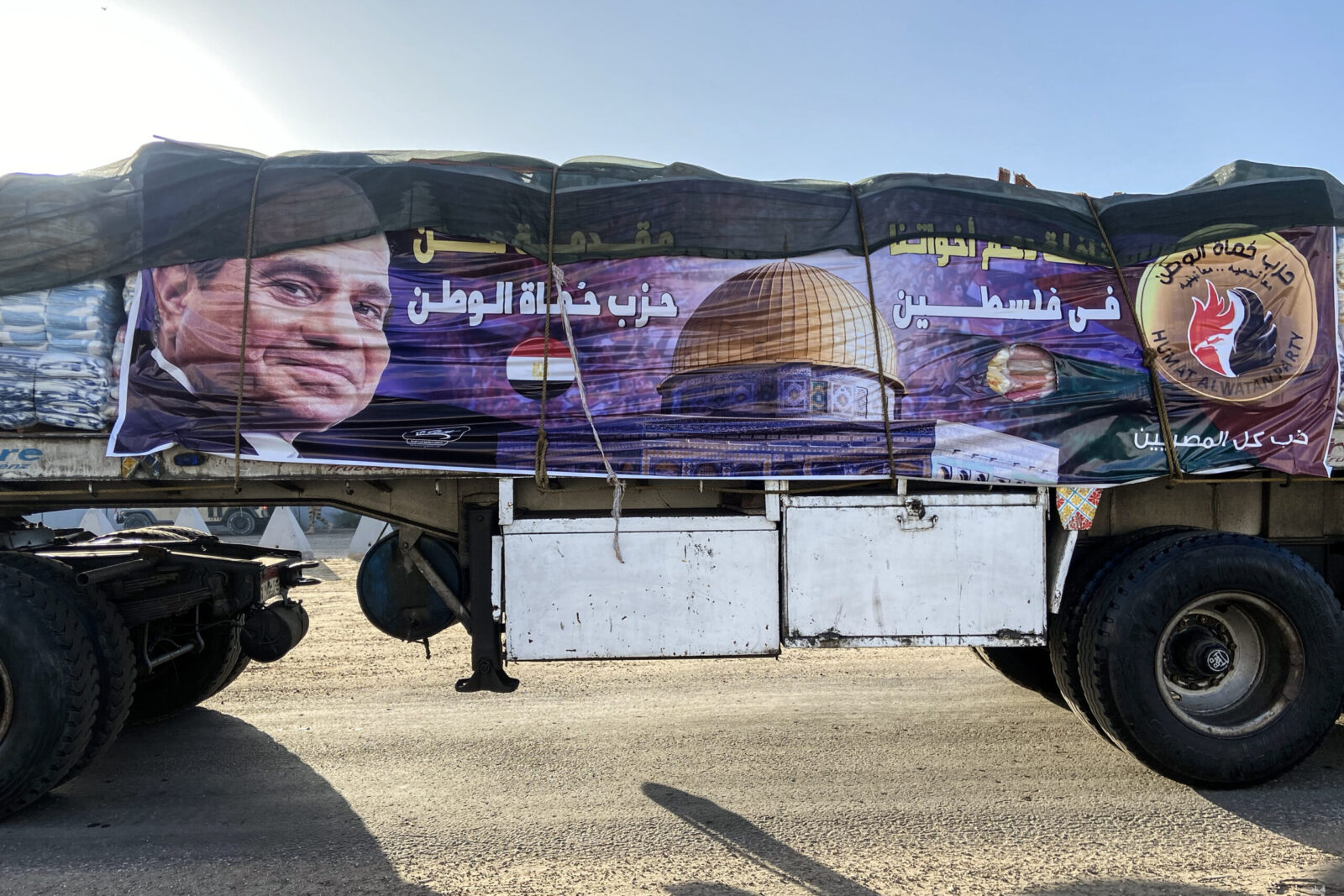
President Abdel Fattah El-Sisi’s image on the side of an aid truck crossing the Rafah border from the Egyptian side into Gaza on November 6, 2023. Mahmoud Khaled/Getty Images
Days earlier, groups allied with the ruling establishment had called for public rallies in support of President Abdel Fattah El-Sisi’s handling of the war in Gaza. They pressed the public to grant Sisi a “popular mandate” (tafwid) just weeks before he faced re-election for a third term in office. Seeking to capitalize on widespread outrage at Israel’s indiscriminate attacks on Palestinians, Sisi’s allies had hoped the rallies would bolster his popularity and drown out public discontent at the deteriorating economy. October 20, however, did not turn into the hoped-for Sisi lovefest.
Many demonstrators dismissed calls to support the president and instead centered their chants on the plight of Palestinians. “This is a real demonstration, not a popular mandate for anyone,” yelled the crowds.[2] Although the mobilization was largely contained, it evoked the spirit of the January 25 Uprising, which ended Hosni Mubarak’s 30-year rule in 2011, and the subversive energy that animated the period between 2011 and 2013. At one point, protestors defied orders to steer clear of Tahrir Square, gathering in a space that has been off limits to demonstrators due to its symbolic connection with the 2011 Revolution.
The events of October 20 reflect a longstanding challenge facing Egypt’s political leadership, exacerbated by the onset of the Gaza war. The government must strike a balance between two competing goals: One is respecting the fundamentals of Egypt’s foreign policy since the 1970s, namely its close alliance with Washington and its cooperation with Israel under the framework of the 1979 Camp David Accords. The other is absorbing and managing the overwhelming sense of public outrage at Israel’s aggression and the US role in aiding the ongoing violence.
News show hosts and anti-regime analysts have also emphasized that the government’s stance on the war aligns with public sentiment, reminding their audiences that official policies reflect popular support for Palestine. Yet, critical observers are not buying it. Protests at the Journalists Syndicate have urged the government to do more to keep the Rafah Crossing open to allow for aid delivery to Gaza and for injured Palestinians to access medical treatment in Egypt. Unsettled by the accusation of being soft on Israel, the regime’s allies in the media were quick to attack these protests and dismiss their calls as pro-Israeli propaganda.
Contrary to a widely held view in mainstream US international media that Israel’s war on Gaza will throw Sisi a lifeline by distracting the Egyptian public from rising prices and the deteriorating state of the economy, the war has thus far kept the president and his government on their toes. Forced to explain themselves to the Egyptian people, state officials and their affiliated media have expended significant energy updating the public about government support for Palestinians, including their diplomatic efforts and support for aid delivery to Gaza. They have responded unusually quickly to every rumor or potentially damaging allegation about the government’s role in the conflict. Notably, President Sisi has adopted measured and careful language in his public addresses, in contrast to the often improvised and on-the-fly style of speaking he tends to employ even when discussing critical policy files. In other words, Palestine has created a rare moment of public accountability for a government that often seems indifferent to popular sentiments.
Meanwhile, some analysts have framed the war as Sisi’s ticket out of economic decline and mounting debts. The political leadership, they speculate, may ultimately choose to trade debt relief in return for cooperating with Israel’s rumored plans to force the resettlement of a large population of Palestinians from Gaza into northern Sinai. Despite the president’s vocal opposition to this purported plan—which can only be described as a second Nakba for the Palestinian people—political commentators have, nonetheless, continued discussing whether Sisi would eventually relent if the right offer were made.
This analysis, however, ignores the challenges such a scenario would pose to Egypt’s security establishment and the destabilizing impact it could have on an already delicate security situation in Sinai, where the state has been fighting an insurgency for much of the last decade. In 2013, the state began displacing residents of Rafah and Sheikh Zuweid in order to establish security zones on the border of Gaza. Many displaced residents have been demanding to return to their homes and mobilizing to this end, making the prospective displacement of Palestinians to Sinai even more politically volatile.
The recent tensions between the Egyptian government and its people over Palestine are by no means unique. For the last several years, a host of Arab leaders have used their unchecked powers to advance US-brokered normalization agreements with Israel under the banner of the Abraham Accords. Following October 7, people throughout the region are challenging these longstanding efforts. They are putting a dent in the Abraham Accords order by mobilizing in solidarity with the plight of Palestinians and signaling to their governments their rejection of any policy undercutting the voice of Palestinians or their right to self-determination. They are refusing to defer to the pacts their leaders have negotiated with Israel behind closed doors and are demanding their voices be heard. The wielders of power may try to ignore them, but people have yet to accept defeat.
[Hesham Sallam is a senior research scholar at Stanford’s Center on Democracy, Development and the Rule of Law (CDDRL), where he serves as the associate director for research.]
Endnotes
[1] “Mustafa Mahmoud Square”, YouTube, October 22, 2023. [Arabic]
[2] “This is a real demonstration, not a popular mandate for anyone. How did Egyptians thwart Sisi’s mandate?” Youtube, October 21, 2023. [Arabic]
[3] The New Arab, “How does Egyptian media cover the offensive aggression on Gaza?” October 25, 2023. [Arabic]
